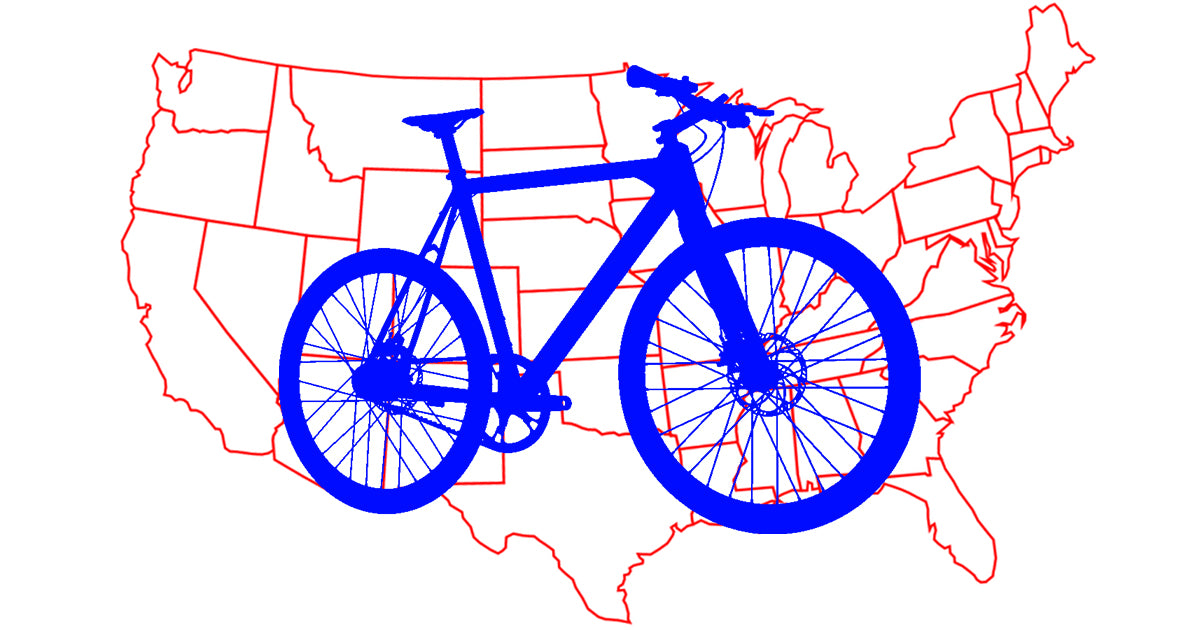
Before considering investing in an FLX bike, it would be beneficial to know your state's regulations on Electric Bicycles.
Because eBikes are a relatively new mode of transportation, regulations differ from state to state.
Thankfully more than half of the country has adopted a three-tiered classification for ebikes. (26 states and growing) These tiers help categorize the broad spectrum that is ebikes. With each class comes a different set of rules and regulations.
The three classes of eBikes are categorized as the following
Class 1: eBikes that are pedal-assist only, with no throttle, and have a maximum assisted speed of 20 mph.
Class 2: eBikes that also have a maximum speed of 20 mph, but are throttle assisted.
Class 3: (a.k.a. Pedelec bikes) eBikes with a motor that provides assistance only if the rider is pedaling and should cease to assist when the eBike reaches 28 miles per hour.
Ebike regulations you should know:
- The Federal speed limit for Class 1 and 2 ebikes is 20 miles per hour (when using the motor alone). Class 3 ebikes are allowed to travel at speeds up to 28 mph (when using both pedal power and the ebike’s motor)
- For Alabama, Alaska, Michigan, New Hampshire, North Carolina, Utah, and Virginia riders must be 14 years old or over to ride an ebike unaccompanied by an adult. Most states do not age requirements to ride an ebike.
- Some states you are required to have a valid license to operate your ebike. (Check list below to see your state requirements.)
- Ebike usage on trails and roads are regulated by local laws. (check in with your local authorities, or trail rules and regulations)
- Most states cap out at 750 or 1000w and some states classify ebikes as mopeds if they have a max power limit above 1000W
- Helmets requirements vary from state to state. (check the list below to see your state requirements)
Alabama: Uses the three-tiered ebike classification. Electric bicycles are regulated like traditional bicycles. Helmets are required for all classes, and all ages
Alaska: Alaska recognizes electric bicycles as a "motor-driven cycle", operating an ebike requires a license and registration. Helmet laws vary (check in with your local authorities)
Arizona: Uses the three-tiered ebike classification. Helmet laws vary (check in with your local authorities)
Arkansas: Uses the three-tiered classification of eBikes. Helmets are required for Class 3 riders under 21 years old.
California: Uses the three-tiered ebike classification. Helmets are required for people under 18 riding a Class 1 and 2 ebike and all ages for Class 3
Colorado: Uses the three-tiered ebike classification. Helmets are required for people under 21 riding a Class 3
Connecticut: Uses the three-tiered ebike classification. Helmets are required for people under 16 riding a Class 1 and 2, and for all ages riding a Class 3
Delaware: Delaware defines eBikes as a "bicycle" as long as the motor is under 750w with a max speed 20mph. People under 18 must wear a helmet for all Classes
Florida: Florida defines ebikes as a "bicycle" capable of being operated by human power. Helmets are required for people under 16 for all Classes
Georgia: Uses the three-tiered ebike classification. Helmets are required for people under 16 riding a Class 1 and 2 and for all ages riding a Class 3
Hawaii: Electric bikes with a max speed of 20 mph are classified as low-speed electric bicycles. Helmets are required for people under 16 for all Classes of Ebikes
Idaho: Uses the three-tiered ebike classification. Helmets are not required to ride an Ebike
Illinois: Uses the three-tiered ebike classification. Helmet laws vary (check in with your local authorities)
Indiana: Uses the three-tiered ebike classification. Helmets are required for people under 18 when riding a Class 3
Iowa: Iowa defines eBikes as a "bicycle" as long as the motor is under 750w with a max speed 20mph. Helmets are not required
Kansas: Ebikes are regulated as electric assisted bicycles as long as the motor is under 1000w with a max speed of 20mph.Helmet laws vary (check in with your local authorities)
Kentucky: Ebikes are regulated as bicycles if they have operating pedals. Helmet laws vary (check in with your local authorities)
Louisiana: Ebikes are regulated as motorized bicycles if the maximum speed is 25mph or over. Helmets are required for all ages when riding a Class 3
Maine: Uses the three-tiered ebike classification. Helmets are required for people 16 or under for all classes
Maryland: Uses the three-tiered ebike classification. Helmets are required for people 16 or under for all classes
Massachusetts: Ebikes are regulated as motorized bicycles if the maximum speed is 25mph or over. Riders must have a license and have their ebikes registered. Helmets are required for all Classes and ages
Michigan: Uses the three-tiered ebike classification. Helmet requirements vary for Classes 1 and 2. Helmets are required for people 16 and under for riding a Class 3
Minnesota: Ebikes are regulated as "electric-assisted bicycle" if they are equipped with a 1000w motor with a max speed of 20mph. Helmets are not required when riding an ebike.
Mississippi: Ebikes are regulated as bicycles with motors attached. Helmet laws vary (check in with your local authorities)
Missouri: Ebikes are regulated as motorized bicycles with speeds that reach 30mph. Helmet laws vary (check in with your local authorities)
Montana: Ebikes are regulated as electric assisted bicycles if it has a max speed of 20mph. Helmet laws vary (check in with your local authorities)
Nebraska: Ebikes are regulated as electric assisted bicycles if they are under 750s with a max speed of 20mph. There are no helmet requirements for riding an ebike.
Nevada: Ebikes are regulated as electric assisted bicycles if they are under 750s with a max speed of 20mph. There are no helmet requirements for riding an ebike.
New Hampshire: Uses the three-tiered ebike classification. Helmets are required for people under 16 riding Class 1 and 2, and people under 18 when riding a Class 3
New Jersey: Uses the three-tiered ebike classification. Helmets are required for people under 17 for all Classes
New Mexico: Ebikes are regulated as Mopeds. Helmets are required for all classes under 18
New York: Ebikes are regulated as bicycles if they are under 750w with functioning pedals. Helmets are required for class 1 and 2 (local laws may vary)
North Carolina: Ebikes are regulated as electric assisted bicycles if they are lower than 1000w with a max speed of 20mph. Helmets are required for people under 16 for all Classes
North Dakota: Ebikes are regulated as motorized vehicles. Operating an ebike requires the same rules, licensing, registration and insurance requirements as motor vehicles. Helmets are not required
Ohio: Uses the three-tiered ebike classification. Helmets are required for Classes 1 and 2 (laws may vary) and for all ages riding a Class 3
Oklahoma: Uses the three-tiered ebike classification. Helmets are required for all Classes
Oregon: Ebikes are regulated as eclectic assisted bicycles if it is under 1000s with a max speed of 20mph. Helmets are required for people under 16 riding all Classes
Pennsylvania: Ebikes are regulated as pedalcycle bikes with electric assistance if they are under 750w, with a max speed of 20mph (powered only by the motor). Ebikes should also weight 100lbs or less, and riders must follow the same road rules as analog bicycles. Helmets are required for people under 12 riding all Classes
Rhode Island: Ebikes are regulated as motorized vehicles. Helmets are required for people under 16 for all Classes
South Carolina: Ebikes are regulated as vehicles. Helmets are not required
South Dakota: Uses the three-tiered ebike classification. Helmets are not required
Tennessee: Uses the three-tiered ebike classification. Helmets are required for people under 16 riding a Class 1 and 2 and for all ages riding a Class 3
Texas: Uses the three-tiered ebike classification. Helmets are required for all classes (Local laws may vary)
Utah: Uses the three-tiered ebike classification. Helmets are not required
Vermont:Ebikes are regular as motor-assisted bicycles. Ebikes that have operating as pedals are regulates as traditional bicycles if they have a max power output of 1000w and a max speed of 20mph. Helmets are not required
Virginia: Ebikes are regulated as electric power assisted bicycles if they are under 1000s with a max speed of 25mph. Helmets are required for all ages riding any Class (local laws may vary)
Washington: Uses the three-tiered ebike classification. Helmets are required for all ages and classes (local laws may vary)
West Virginia: Ebikes are regulated as mopeds, and riders must have a license and insurance to operate one. Helmets are required for classes 1 and 3 (Local laws may vary)
Wisconsin: Ebikes are regulated as motor bicycles if the motor is under 750w with a max speed of 20 mph. Riders must register their ebikes and have a license to operate. Local laws vary (check in with your local authorities)
Wyoming: Uses the three-tiered ebike classification. Helmets are not required





Share:
San Diego Tesla Weekend Giveaway Winners
Bad Santapalooza!